what dictionary can you use to find domain specific words
Today we're chatting almost the importance of explicitly instruction domain specific vocabulary. This standard calls for students to be able to determine the meaning of full general bookish and domain-specific words and phrases in a grade-level text, and whether you follow Common Cadre Standards, state standards, or live somewhere else effectually the globe, this plan of attack for teaching vocabulary volition exist relevant for you, likewise. Nosotros're going to really focus in on domain specific vocabulary today and how to infuse that into your unit of measurement plans and instruction.
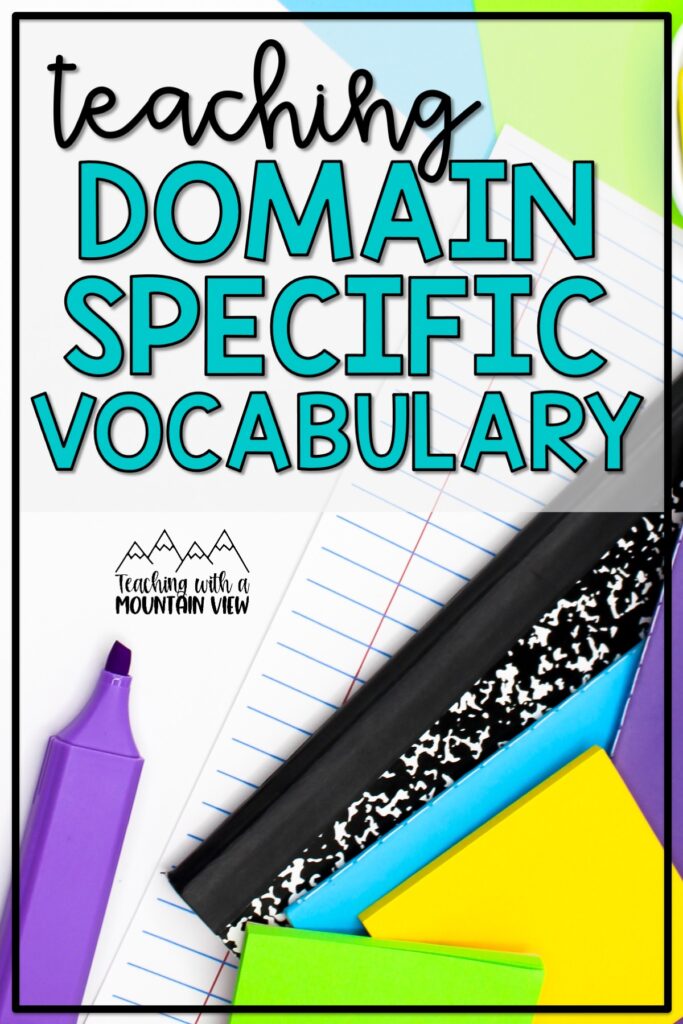
Vocabulary teaching may or may not come naturally to you equally a part of your literacy instruction, merely is it front of mind equally you're planning instruction outside of literacy? We're going to chat nigh the importance of explicitly education domain specific vocabulary outside of the literacy classroom (and within of, a little bit) and how I approach this educational activity in a very sequential way.
What is domain specific vocabulary?
Domain specific vocabulary refers to vocabulary terms that are specific to a topic of study. This is our precise, content-related vocabulary that is infused throughout our units. These may exist the words that are on our word walls and prove up in glossaries of our math, science, and social studies textbooks.
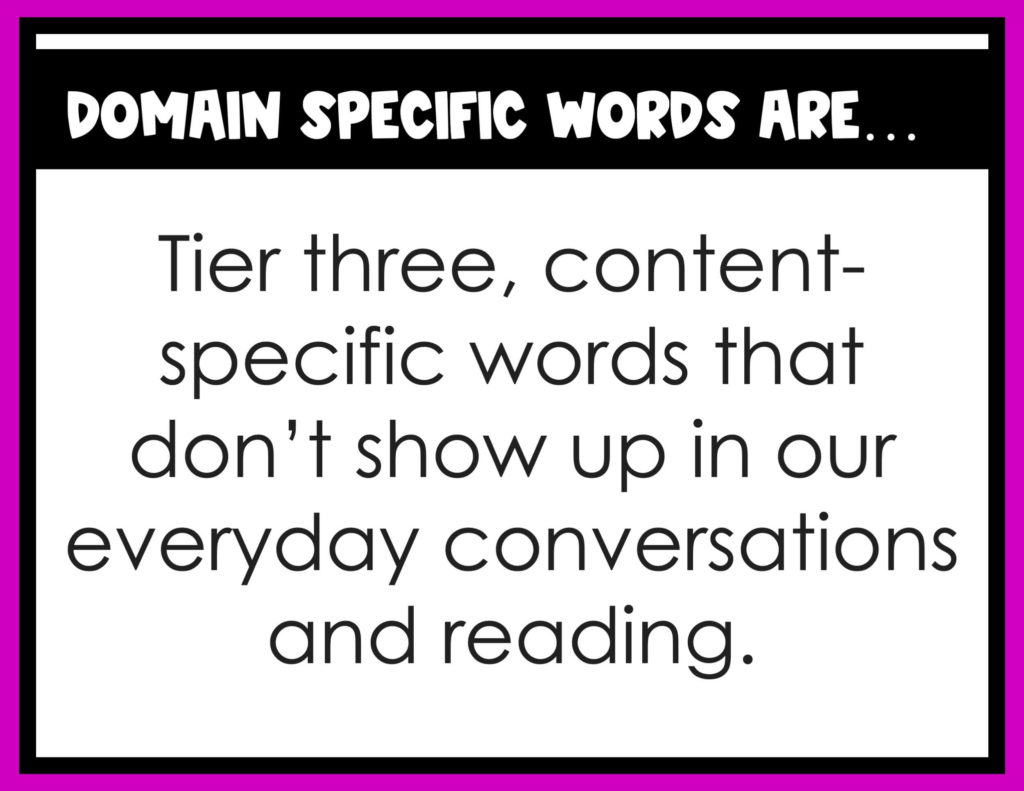
When thinking about the three tiers of vocabulary words, domain-specific words fall into the tier three category of words… the words that are non a part of our normal vocabulary, unless nosotros are engaged in a conversation or written report about a particular topic.
In science, domain specific words might include things like photosynthesis, hibernation, nocturnal, classification, species, hypothesis, etc.
In math, domain specific vocabulary refers to very precise math vocabulary terms similar equivalent, quotient, product, etc.
Word walls are wonderful, students absolutely must know how to use a dictionary to look upward the meaning of unknown words, and I'k a gigantic fan of using interactive notebooks to continue notes about specific vocabulary terms, simply when we get into the nitty gritty of domain-specific words, I follow a program of introduction that enables students to naturally collaborate with the words in a way that encourages mastery and understanding and as well in a mode that prepares them to assault these words in the future without your direct instruction.
The research behind information technology…
Research shows that it tin accept upwardly to 17 exposures for children to put a new word into their long term memory. We accept so many strategies at the ready to teach students new words, but we have to remember: repeat, review, call back, repeat, review, retrieve, repeat, review, call up. The more students are exposed to these words authentically, the meliorate understanding they will truly take of the word.
Where practice I observe these vocabulary words?
I highly encourage you to first with your units of study to find your domain-specific vocabulary. The point here isn't necessarily to principal a specific listing for each grade level, merely to principal the words that are authentically showing up in YOUR units of report and to go comfortable working with big, meaning-filled words in context. Whatever time I am planning out a unit, I e'er make a list of important vocabulary words every bit I programme the content.
How I specifically and intentionally incorporate domain-specific vocabulary into my units of written report without my students even really knowing it.
When introducing words, I follow a specific procedure to expose them to these words:
Note that this is a flake of a different approach from the typical "give and receive" where we straight up give students definitions of domain specific words, have them copy them, write them in a sentence, etc. While there is admittedly a time and a identify for these things (information technology shows up in this sequence!), this approach exposes them to the give-and-take in a systematic manner to help them develop their own understanding of it so their understanding is not simply a regurgitation of what we've told them. Our goal is to nurture nightingales or canaries who can write and develop their ain "vocabulary vocal," non parrots who repeat and regurgitate words and lexicon definitions with no real pregnant.
During each of these layers of education, be certain you lot are specifically calling out the words and talking nearly their significant each and every time they are exposed to them. While this should seamlessly integrate into your unit (students shouldn't know yous are actually honing in on vocabulary at every juncture within this process), it'due south important to annotation that this process is in addition to whatever other learning engagements yous are working on during the given unit, which means they volition be further authentically exposed during stations, experiments, etc.
Our ultimate goal here is to encourage students to gain independence in gathering vocabulary knowledge, meaning we desire them to tune in to this content-specific vocabulary (instead of just blazing past it like many children volition exercise when confronted with an unknown and daunting word…). We want them to pick out these technical terms and take strategies they can utilise to approach them.
Will yous always be able to follow this sequence every bit y'all introduce academic vocabulary? Absolutely not. But the more often you tin can utilise at least parts of it, the more than it will go second-nature for students to collaborate with vocabulary words.
Throughout the process, we volition utilise so many modalities: visual, auditory, tactile through writing, etc. that are all proven by research to be essential to vocabulary acquisition.
My Arroyo to Teaching Vocabulary
Approach and Expose Information technology: Begin with authentic texts (picture books are best here! If you can discover a picture book that incorporates your words, that's primal!) and easy-to-watch videos so they can meet the words (or most of the words) used in a relatable, approachable scenario. Incorporating video is especially important because they need to hear the word pronounced correctly past multiple people, multiple times. Bonus points if you can find a video with captions! This goes for all video viewing. I e'er turn on captions for my students who may not process the auditory quite as well only thrive with reading on the screen (bonus points for extra reading fourth dimension, too!).
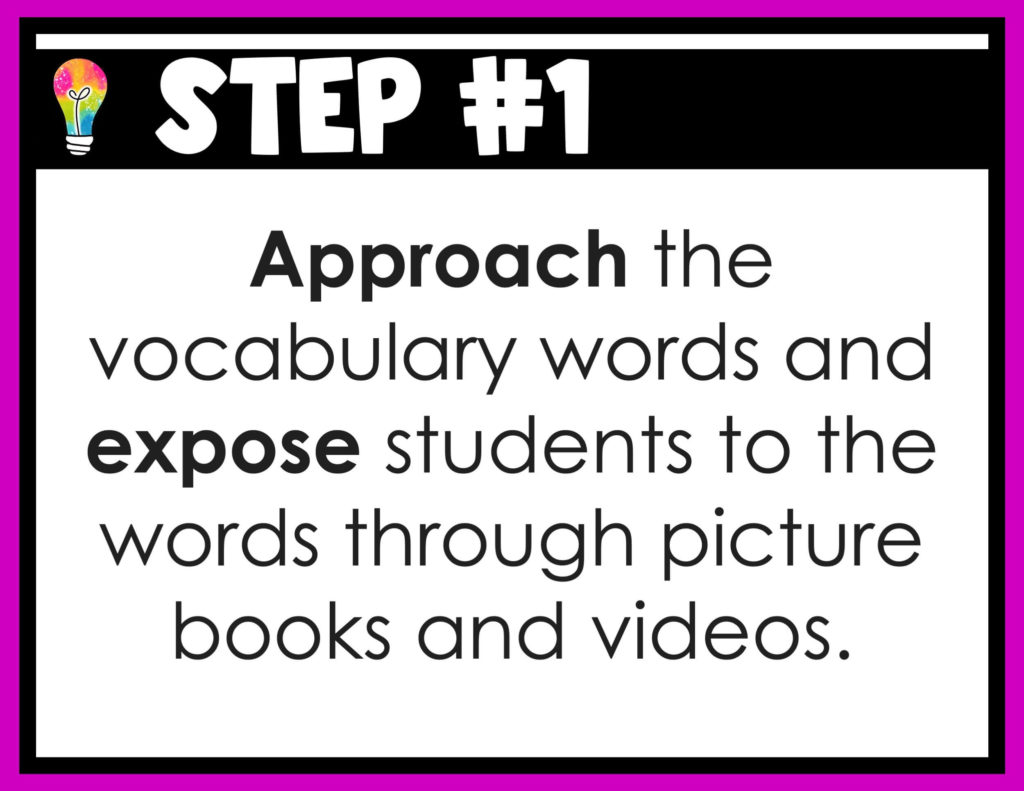
Read It: Now that we've approached it and started to expose the vocabulary without that super explicit educational activity, it's fourth dimension to read it. Move on to more than specific nonfiction passages where yous move through a shut read and utilise context clues to dissect the words and their meanings based on text features, context clues, pictures, etc. This is bold that you've already tackled using context clues in the classroom and unlike means to use context clues to approach new words. This is a slap-up opportunity to find newspaper manufactures or texts that have smashing text features that aid add to the vocabulary word'due south meaning. This is the bespeak where we are explicitly teaching our students specific strategies to apply when they are confronted with unknown words in their technical texts. This is the equivalent of a close read, and I highly recommend this exist washed in a small group setting with differentiated texts, if possible.
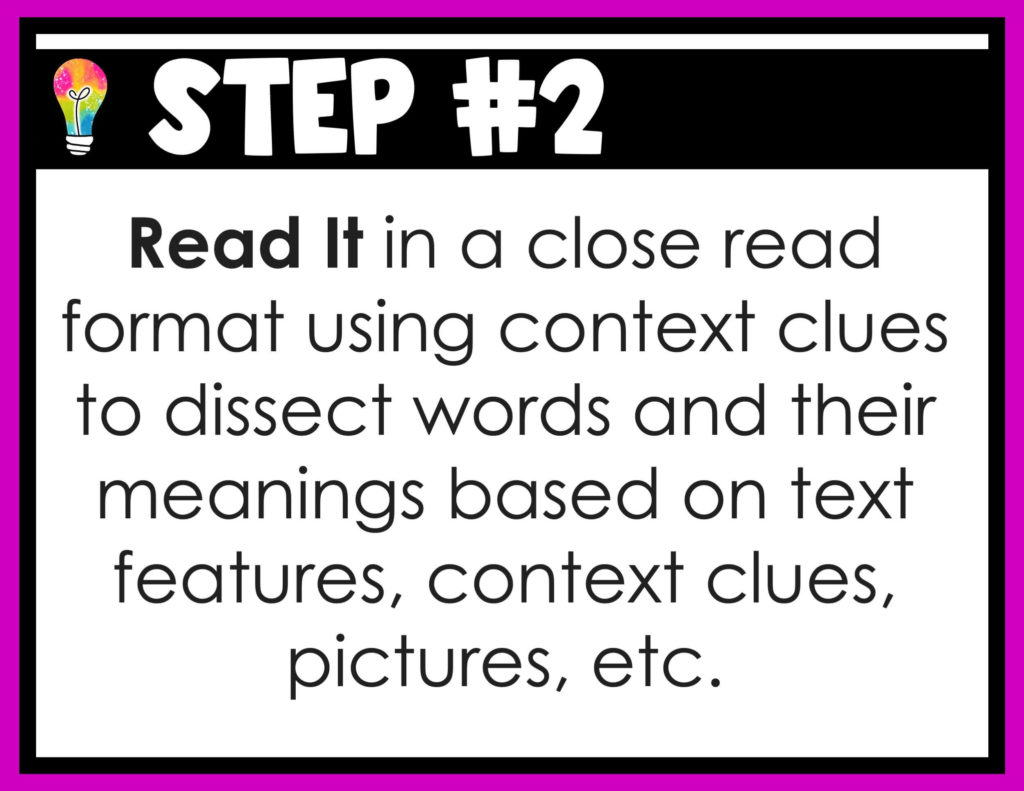
Perform Information technology : At this betoken, we've already been exposed to the words through a video, book, and some sort of shut read. Now, it's time to perform it. Contain the words into a educatee presentation where the content is already made for them. For example, accept students participate in a reader's theatre, a poetry presentation, or drama circle that uses the words and then that they tin can get familiar with not simply the significant of the word but have the opportunity to verbalize it, do perfecting the pronunciation, correct usage within a judgement, etc. They aren't having to exercise a lot of generation of idea here, but they are having to work with the word. This can even be as simple as finding more picture show books and doing a quick book talk that uses those specific words. The key is that they aren't doing a ton of generation of new content here, but they are however working with the words. Yous even become some bonus points here if you are having students perform information technology in front end of the rest of the class, which further exposes the remainder of the students to the vocabulary terms again and again.
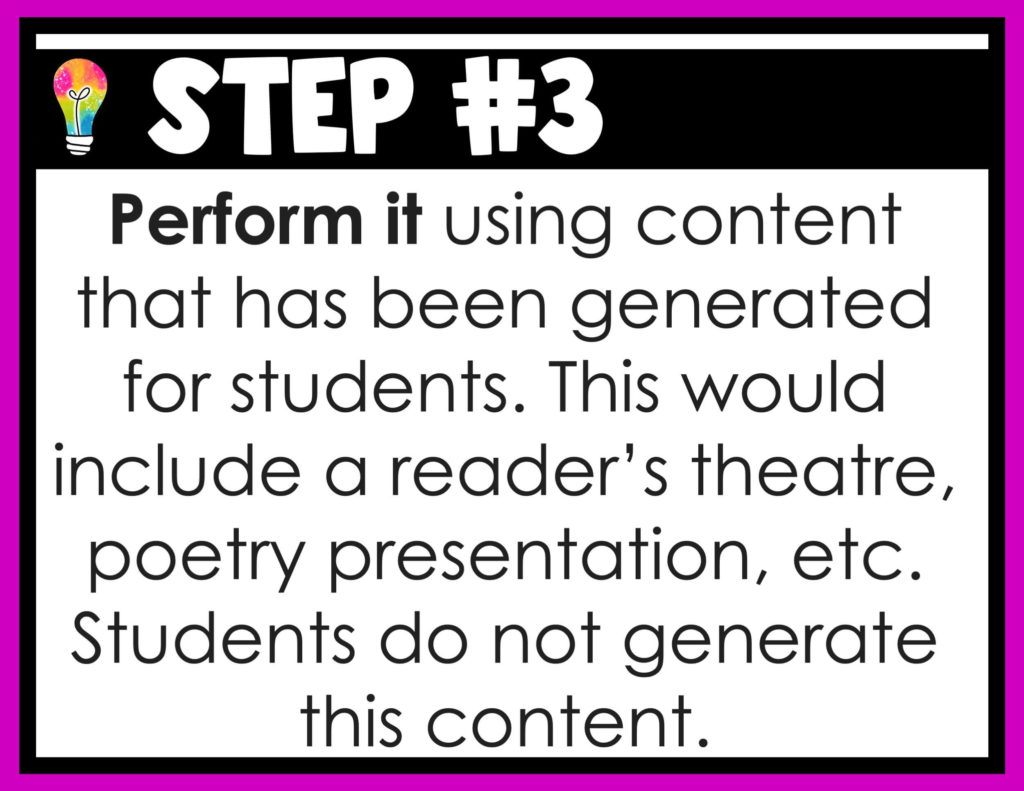
Note It: This is the office that we typically retrieve about when nosotros consider incorporating vocabulary into our study, and if y'all prefer to move this upwards before students perform, that's perfect, besides. I like to practise this portion after a performance because it gives students the opportunity to generate their own definition, and then nosotros can refine it together here.
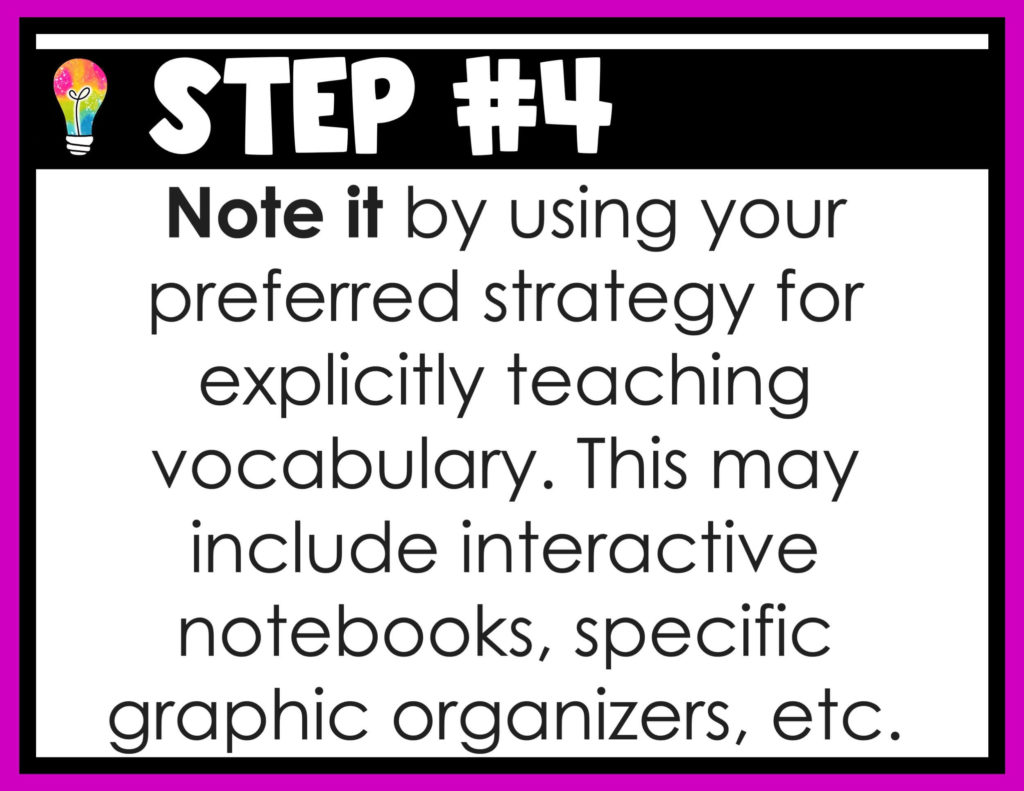
By this point, they will accept had multiple exposures to the discussion and opportunities to dissect the word. This is when y'all will really take and dissect the word parts (affixes and roots), talk almost different meanings, tenses, and variations, how it relates to your content, your life etc. This is a keen fourth dimension to use non-examples of the words, talk most synonyms and antonyms, etc. This is your VERY SPECIFIC vocabulary study portion of your unit of measurement. For instance, this is a great time to point out that in that location are words that nosotros use in math that are used all the time outside of math, literacy, science, etc. Be sure to have all of the content from the first three steps at the ready to use as notes.
A quick bated almost word parts
This is the perfect time to incorporate word parts. While information technology may or may not exist office of your vocabulary instruction normally, this is an ideal time to integrate prefixes, suffixes, and roots (which are also domain-specific words!) seamlessly into your teaching. Any time I have the opportunity to point out discussion parts, I do!
For Example: When I'k teaching near division, and I'grand didactics remainders, I Ever point out that "remain" is part of the word.
If you're teaching about habitats, y'all tin can throw in
Aquatic (aqua)
Domestic (habitation means home, then does domestic)
This is the fourth dimension where students…
- Have notes in interactive notebooks with definitions, examples, and pictures of the words.
- I'k including two options for graphic organizers that you tin utilize with your students. There are interactive notebooks here likewise equally a specific word study page that you can use to dive securely into specific words.
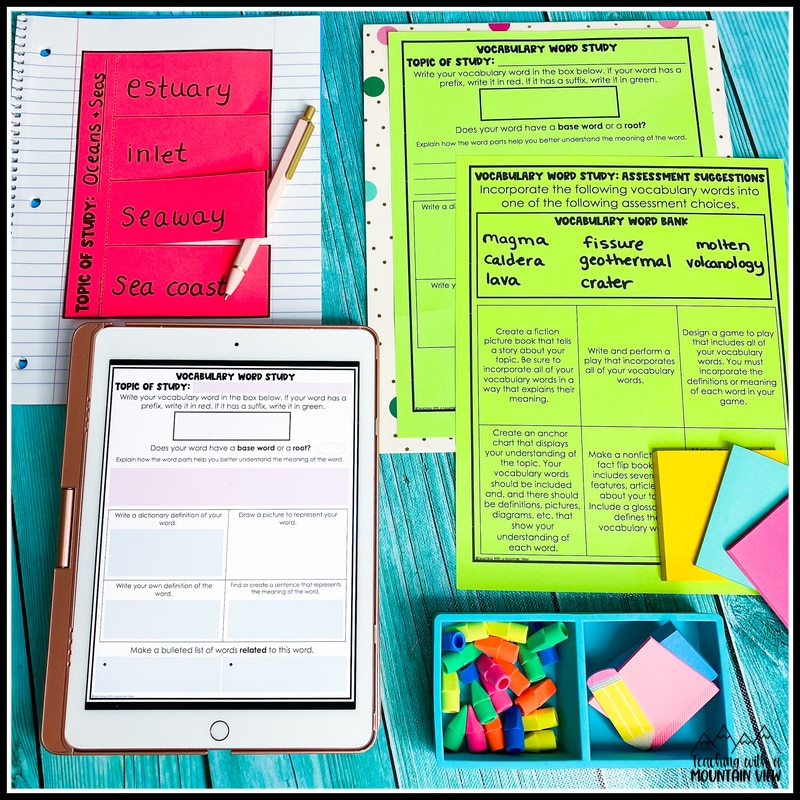
- This is a great time to comprise graphic organizers like the Frayer Model, where students look at specific definitions, characteristics, examples, and not examples.
- Semantic maps or mind maps are another style to have notes well-nigh your vocabulary words, and kids Honey this! You lot place your requite word in the middle and create a map or web to show the meanings and connections. I totally recommend doing one of these during unit studies and eventually finding a manner to necktie ALL of your vocabulary words into map.
- Utilize Cloze context clues, activities here or even nonsense words in place of the vocabulary words for students to practice selecting the appropriate words.
- Employ It: Students complete a performance-based job that incorporates the words. This is the opposite of the "Perform it" section, where they really weren't generating whatever content. This time they are doing ALL the generation. This can come in the class of a presentation, research project, creating a game, writing their own picture book about the topic, etc. Annihilation that you tin employ that they are showing you an understanding of the word. This can be your cumulative assessment about the topic equally a whole, and information technology tends to be so much more accurate to gauge understanding than a pencil/newspaper vocabulary test. I've included several options for you to use as cumulative activities for Any unit of measurement that incorporate your domain-specific vocabulary words.
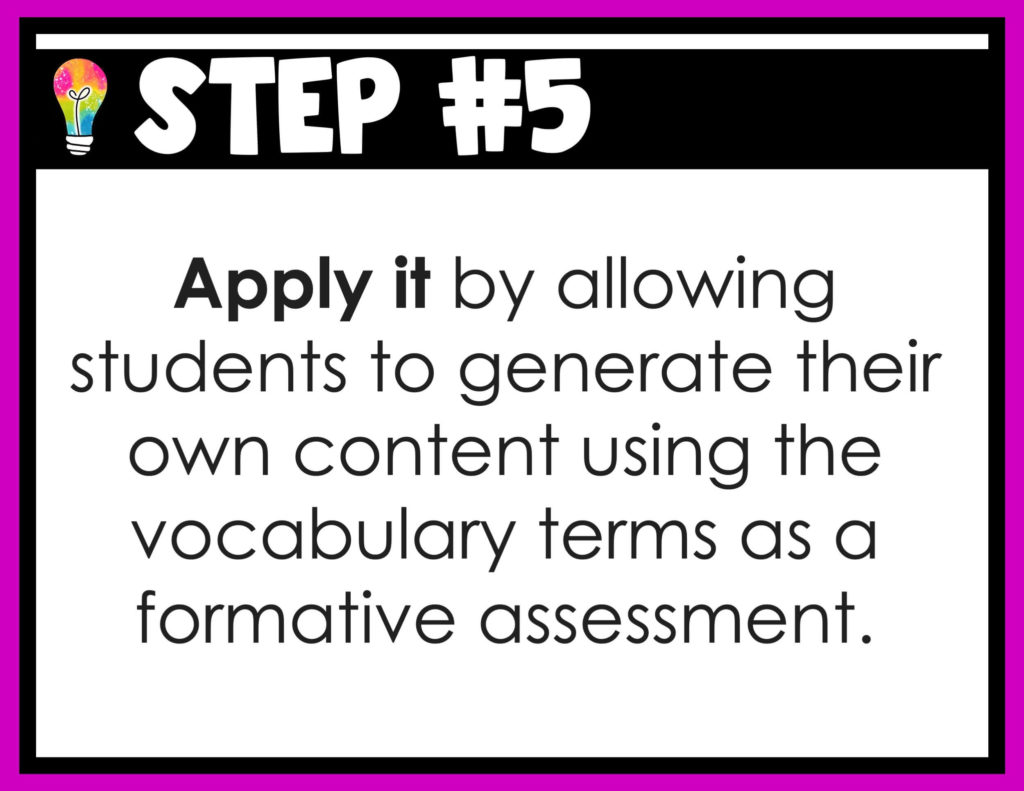
- Recall and recollect: Brand sure yous are giving aplenty opportunities to utilise retrieval practice and remember the words and their meanings WITHOUT anything in front end of them.
Bottom line: Exposure is disquisitional, but so is direct teaching so that they can transfer these skills to any of their reading.
FREE Vocabulary Templates
Remember that the main goal here is not only to master the domain-specific vocabulary you are currently working on, but to equip students to approach these words and full general vocabulary words at whatever time.
I hope this leaves you lot feeling well-equipped to brainstorm tackling this catchy, but oh, then important vocabulary skill and that you are leaving with a program for approaching information technology in the future.
Post Views: 5,358
doughertyalacertut.blogspot.com
Source: https://teachingwithamountainview.com/teaching-domain-specific-vocabulary/?utm_source=rss&utm_medium=rss&utm_campaign=teaching-domain-specific-vocabulary
Post a Comment for "what dictionary can you use to find domain specific words"